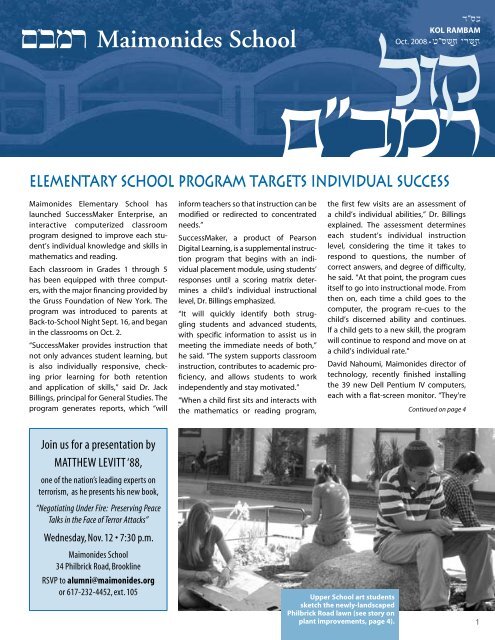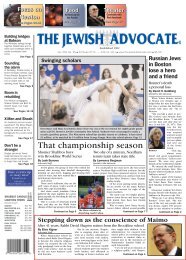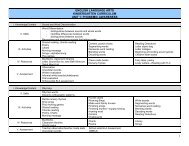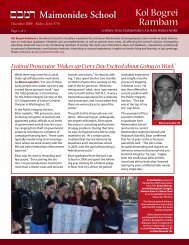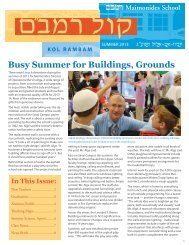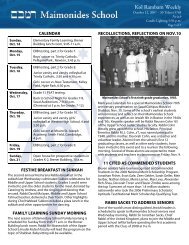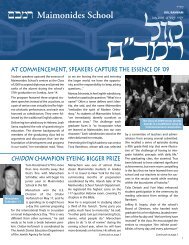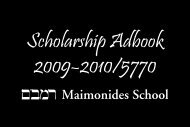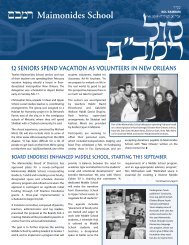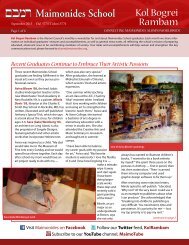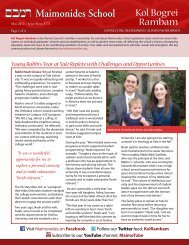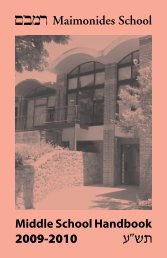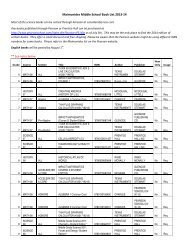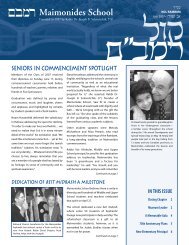Fall 2008 - Maimonides School
Fall 2008 - Maimonides School
Fall 2008 - Maimonides School
You also want an ePaper? Increase the reach of your titles
YUMPU automatically turns print PDFs into web optimized ePapers that Google loves.
KOL RAMBAM<br />
Oct. <strong>2008</strong> • hŠqyz ixyz<br />
ELEMENTARY SCHOOL PROGRAM TARGETS INDIVIDUAL SUCCESS<br />
<strong>Maimonides</strong> Elementary <strong>School</strong> has<br />
launched SuccessMaker Enterprise, an<br />
interactive computerized classroom<br />
program designed to improve each student’s<br />
individual knowledge and skills in<br />
mathematics and reading.<br />
Each classroom in Grades 1 through 5<br />
has been equipped with three computers,<br />
with the major financing provided by<br />
the Gruss Foundation of New York. The<br />
program was introduced to parents at<br />
Back-to-<strong>School</strong> Night Sept. 16, and began<br />
in the classrooms on Oct. 2.<br />
“SuccessMaker provides instruction that<br />
not only advances student learning, but<br />
is also individually responsive, checking<br />
prior learning for both retention<br />
and application of skills,” said Dr. Jack<br />
Billings, principal for General Studies. The<br />
program generates reports, which “will<br />
inform teachers so that instruction can be<br />
modified or redirected to concentrated<br />
needs.”<br />
SuccessMaker, a product of Pearson<br />
Digital Learning, is a supplemental instruction<br />
program that begins with an individual<br />
placement module, using students’<br />
responses until a scoring matrix determines<br />
a child’s individual instructional<br />
level, Dr. Billings emphasized.<br />
“It will quickly identify both struggling<br />
students and advanced students,<br />
with specific information to assist us in<br />
meeting the immediate needs of both,”<br />
he said. “The system supports classroom<br />
instruction, contributes to academic proficiency,<br />
and allows students to work<br />
independently and stay motivated.”<br />
“When a child first sits and interacts with<br />
the mathematics or reading program,<br />
the first few visits are an assessment of<br />
a child’s individual abilities,” Dr. Billings<br />
explained. The assessment determines<br />
each student’s individual instruction<br />
level, considering the time it takes to<br />
respond to questions, the number of<br />
correct answers, and degree of difficulty,<br />
he said. “At that point, the program cues<br />
itself to go into instructional mode. From<br />
then on, each time a child goes to the<br />
computer, the program re-cues to the<br />
child’s discerned ability and continues.<br />
If a child gets to a new skill, the program<br />
will continue to respond and move on at<br />
a child’s individual rate.“<br />
David Nahoumi, <strong>Maimonides</strong> director of<br />
technology, recently finished installing<br />
the 39 new Dell Pentium IV computers,<br />
each with a flat-screen monitor. “They’re<br />
Continued on page 4<br />
Join us for a presentation by<br />
MATTHEW LEVITT ‘88,<br />
one of the nation’s leading experts on<br />
terrorism, as he presents his new book,<br />
“Negotiating Under Fire: Preserving Peace<br />
Talks in the Face of Terror Attacks”<br />
Wednesday, Nov. 12 • 7:30 p.m.<br />
<strong>Maimonides</strong> <strong>School</strong><br />
34 Philbrick Road, Brookline<br />
RSVP to alumni@maimonides.org<br />
or 617-232-4452, ext. 105<br />
Upper <strong>School</strong> art students<br />
sketch the newly-landscaped<br />
Philbrick Road lawn (see story on<br />
plant improvements, page 4).
Brener Builds A CHESED COMMUNITY<br />
Kindergartener Isaac Jacobson, left,<br />
and second grader Yaakov Baker<br />
design a Rosh Hashanah card for<br />
members of the IDF.<br />
Chesed always has been a central part of<br />
the <strong>Maimonides</strong> <strong>School</strong> curriculum. This<br />
academic year, there are “internal and<br />
external components,” says Rabbi David<br />
Saltzman, Elementary <strong>School</strong> principal.<br />
The internal aspect is experienced as<br />
students participate as an integrated<br />
community: Chesed l’Chaverim.<br />
“We divided the school into mini-communities,”<br />
with each group including the<br />
entire range of grades, Kindergarten to<br />
Grade 5, said Rabbi Saltzman. “The goal<br />
is for the kids to all know each other, to<br />
greet each other in the hallway, to foster<br />
communal responsibility. A first grader<br />
will have the opportunity to interact<br />
with a fourth grader.”<br />
Joanna Parker, Grade 1 Judaic studies<br />
teacher, is coordinating the program this<br />
academic year, and she kicked things<br />
off last month by introducing Chesed<br />
Continued on page 6<br />
Teshuvah: Restorative or Transformative<br />
By Rabbi David Shapiro, Rosh Yeshiva; Chairholder, Rabbi Yitzhak Twersky Chair in Talmud and Jewish Thought<br />
<br />
[This dvar Torah is based upon shi’urim of the<br />
Talner Rebbe, HaRav Yitzhak Twersky, zt”l]<br />
In Massechet Rosh Hashanah (16b) R.<br />
Yitzchak offers four strategies that each<br />
Jew should employ in order “to have<br />
the decree against him torn up.” The<br />
fourth is shinui ma’aseh, “changing one’s<br />
actions.”<br />
Rashi interprets shinui ma’aseh as shav<br />
mei-ra’ato, “he abandons his evil ways.”<br />
This conception of teshuvah—the commonly-accepted<br />
one, to be sure—is<br />
minimalistic. It is only “restorative;”<br />
that is, the person aspires only to repair<br />
the damage to his record, to remove<br />
the entries in the debit column, and to<br />
achieve the status quo ante.<br />
Ritva was not satisfied with Rashi’s<br />
approach. In his commentary to our<br />
Talmudic passage he writes:<br />
Rashi’s interpretation does not appear to be<br />
correct. Obviously, if one repents without<br />
abandoning his evil ways … his teshuvah will<br />
not be efficacious. Rather, [what R. Yitzchak<br />
(in our Talmudic passage) means is:] he abandons<br />
even those actions that are formally<br />
permissible but are slightly inappropriate.<br />
That is to say; he becomes another person<br />
entirely...<br />
Amongst the strategies employed by, and<br />
the characteristics of, ba’alei teshuvah are …<br />
[and it is as if he says] “I am another person;<br />
I am no longer the person who committed<br />
those acts.” He changes his entire behavior<br />
now, doing [only] what is good and upright.<br />
We find a similar characterization of teshuvah<br />
in Moreh Nevuchim (Rambam’s<br />
Guide for the Perplexed) [III:36]:<br />
… he can correct himself, and return to a<br />
better and more perfect state than the one<br />
he was in before he sinned.<br />
This type of teshuvah, portrayed by<br />
Rambam and Ritva, is not merely “restorative”;<br />
it aims to be “transformative.”<br />
The spiritual process of teshuvah is<br />
often compared to the physiological/<br />
medical process of healing. Yishayahu,<br />
for example, states (6:10): ve-shav, verafa<br />
lo, “he will repent, and he will be<br />
healed.” Yirmiyahu later said (3:22):<br />
Shuvu banim shovavim; erpa meshuvoteichem,<br />
“Repent, you wayward sons; I shall<br />
heal your waywardness.” David haMelech<br />
had already petitioned (Tehillim<br />
41:5): Refa’a nafshi ki chatati lach, “Heal<br />
my soul for I have sinned against you.”<br />
We might thus say that the “restorative”<br />
mode of teshuvah aims to address the<br />
symptomatic behavior, whereas the<br />
more ambitious “transformative” mode<br />
of teshuvah seeks to address the underlying<br />
cause (the etiology) of that inappropriate<br />
behavior.<br />
Although Ritva does not refer to<br />
Rambam, there is no doubt that he was<br />
influenced directly by the latter’s formulation<br />
DVAR<br />
in Hilchot Teshuvah (2:4):<br />
TORAH<br />
Dynamic psychologists would speak<br />
of manifest behavior as representative<br />
of the deeper, latent content of one’s<br />
psyche (which ultimately defines personality).<br />
If I find myself engaging too often in<br />
leshon ha-ra, it is not enough to resolve<br />
to avoid it. I must ask myself: what<br />
need within me does this inappropriate<br />
behavior meet?<br />
If I fail to daven regularly, it is not sufficient<br />
to make a commitment to try and<br />
comply with halachic expectations. Is it<br />
a theologically based skepticism about<br />
the role of prayer that allowed me to<br />
lapse? Is there a fundamental deficiency<br />
in my commitment to halachah?<br />
If someone offended me and has sought<br />
forgiveness repeatedly, to be met only<br />
by my unyielding resentment—what<br />
ethical flaw in my inherent character<br />
prevents me from “letting go” of my<br />
anger? These are the type of questions<br />
that “transformative teshuvah” seeks to<br />
address.<br />
Let us each strive to achieve “transformative<br />
teshuvah” in the spirit of the pasuk<br />
that we read in Eichah(3:40): Nachpesah<br />
deracheinu ve-nachkorah, ve-nashuvah el<br />
Hashem, “Let us each search and examine<br />
our ways, and return to Hashem.” May<br />
we thereby merit a ketivah va-chatimah<br />
tovah for each member of our extended<br />
families and communities. •
GRADUATE GROWING IN ROMANIA<br />
Seven years ago, during a kiddush in an Upper East Side shul, Nahum<br />
Palefski ’96 re-introduced David Flusberg ’93 to Dvir Cohen Hoshen,<br />
who once briefly attended <strong>Maimonides</strong> while his parents were on a<br />
sabbatical from Israel.<br />
David and Dvir became friends, and even worked together on some<br />
small business ventures while Dvir studied at Tel Aviv University. Then,<br />
in 2004, David relates, “Dvir wanted me to join him in Romania so we<br />
could brainstorm together how to create a real estate venture that<br />
would combine his Israeli ‘commando’ skills with my American ‘packaging’<br />
skills.” After visiting Bucharest for three weeks, the opportunity<br />
“seemed to be worth trying.”<br />
David Flusberg<br />
‘93 in his<br />
Bucharest<br />
office<br />
Today David is co-founder and president of<br />
Adama Holding Group, considered the most<br />
important residential developer in Romania.<br />
“Currently we are constructing and selling<br />
3,000 apartment units on 15 different sites,<br />
and we have another 10,000-plus units in<br />
the development pipeline on lands we own,”<br />
David reports.<br />
The company employs 150 people in 10 cities<br />
across Romania (including 40 Israelis), and is<br />
also active, “via subsidiaries that we established<br />
or acquired, in Ukraine and in Turkey.<br />
We also have a small office in Moldova,<br />
where we are developing a shopping mall,<br />
and a satellite office in Israel.” The total value<br />
of Adama’s completed portfolio is approximately<br />
3 billion euros, he adds.<br />
It didn’t start out that way. For 18 months, beginning in June 2004,<br />
“Dvir and I were living and working out of a decaying, roach-infested<br />
apartment in Bucharest. It was a very intense and difficult period, and<br />
we barely had the startup budget to survive. However, we spent the<br />
year getting to know the market at all levels and positioned ourselves<br />
as smart, trustworthy operators who knew how to work locally in a very<br />
difficult environment, but at the same time were ethical and transparent<br />
enough to work with the many foreign investors who wanted to<br />
enter the market but didn’t know how.”<br />
“At the end of 2005, the world changed for us,” David continues. “After<br />
some months of tough negotiations, we brought in a multi-billiondollar<br />
U.S. investment fund as a partner to Adama, and restructured<br />
the business. The capital raised in this round totaled 50 million euros,<br />
and with these funds we secured a new office space, started acquiring<br />
more land, building up a local brand and hiring Israeli and Romanian<br />
management to handle finance, engineering, marketing and legal<br />
aspects of the development business.”<br />
David is upbeat about the future, “since we are in a region where the<br />
real estate cycles are still at a very early stage—the demand is much<br />
higher than supply, and mortgages are very new.” Although Romania<br />
and its neighbors are still bogged down by bureaucracy, corruption<br />
and “primitive business ethics, Adama has a special formula for how<br />
to get the job done in a way which is both clean and effective, so we<br />
Continued on page 5<br />
Mazal tov to…<br />
Evelyn and Naftali (Herbert) Stern ‘57 on the birth of a granddaughter.<br />
Naomi (Krimsky) ’88 and Yitzi Hollander on the recent bar mitzvah of their<br />
son Yossi.<br />
Sarah Levine ’88 and Dr. Hylton Joffe on the birth of their daughter, Hannah<br />
Diane.<br />
Dr. Aliza Levine ’90 and Eric Brown on the birth of their daughter, Lilah<br />
Arielle.<br />
Eitan Levisohn ’92 on his engagement to Dina Epstein.<br />
Rabbi Ari ’92 and Deborah Rockoff on the birth of their daughter, Talya<br />
Temima.<br />
Shoshana (Cohen) ‘94 and Dov Glickman on the birth of their son, Maor Levi.<br />
Grandparents are Dr. Richard ‘73 and Edith Cohen.<br />
Yochanon ’94 and Henni Stein on the birth of their son, Yehudah.<br />
Rabbi Dani ’95 and Dr. Ayala Rockoff on the birth of their son, Shimon<br />
Yaakov.<br />
Dr. Shira (Langenauer) ’95 and David Galper ’93 on the birth of their son,<br />
Avi Noam.<br />
Dr. Avner ’96 and Annie (Lopkin) Aliphas ’96 on the birth of their son,<br />
Gabriel Ethan.<br />
Erica Bogdansky ’96 on her marriage to Reuben Scherzer.<br />
Avrum ’96 and Hilary Leeder on the birth of their son, Lev Shalom.<br />
Debbie Marton ’96 on her engagement to Koby Frances.<br />
Nathaniel Segal ‘96 on his marriage to Margalit Friedman.<br />
Shuli (Gertel) ’97 and Rabbi Avi Bossewitch on the birth of a daughter, Tova<br />
Nechama. Grandparents are Reva (Levovitz) ‘68 and Harvey Gertel.<br />
Dr. Natan ’97 and Nava Krohn on the birth of their son, Zachary.<br />
Alan ’98 and Lisa Houben on the birth of their daughter Zehava.<br />
Ari Katz ’99 on his marriage to Shari Sperling.<br />
Philip ‘99 and Arielle Moskowitz on the birth of their son, Moshe Yitzchak.<br />
Elisha and Rabbi Dov Huff ’00 on the birth of their son, Akiva Shalom.<br />
Jon Lopkin ’00 on his marriage to Nichole Greenberg.<br />
Alyson (Singer) ’00 and Jeffrey Seidman on the birth of their daughter,<br />
Ariella Malka.<br />
Aryeh Keehn ’01 on his marriage to Karen Lopata.<br />
Adam Aghion ’02 on his engagement to Abby Baer.<br />
Jonathan Sokolowski ’03 on his engagement to Lisa Kaller.<br />
Joshua Vogel ’03 on his marriage to Tamar Grun.<br />
Elise Kohen ’04 on her marriage to David Askenazi.<br />
Veronika Blinder ’06 on her marriage to Sergey Antonov.<br />
Condolences to<br />
Pamela Potter ’77 on the loss of her beloved mother, Ethel Potter, z”l.<br />
Jessica Hammer ’94, Alison Hammer ’97, Dana Hammer and David<br />
Hammer ’01 on the loss of their beloved father, Dr. Michael Hammer, z”l.<br />
Rebecca Jacobs ’74, Abigail (Jacobs) Wyschogrod ’75 and Sarah Jacobs<br />
’78 on the loss of their beloved father, Rabbi David Jacobs, z”l.<br />
Isaac Mozeson ’69, Zivia Polsky ’70, Chaya Sara Cohen and Rabbi Yonatan<br />
Mozeson on the loss of their beloved father, Rabbi Leon Mozeson, z”l (see<br />
story, page 8).<br />
Elise Goldman-Gurvis ’76 on the loss of her beloved mother, Claire Goldman,<br />
z”l.<br />
Shayna<br />
ALUMNI<br />
Heller ’72, Abba Leeder, Dr. Asher Leeder ’69, Mordechai Leeder<br />
’65, and Rabbi Yehoshua Leeder ’66 on the loss of their beloved sister,<br />
Berdeena Leeder Maniates ‘69, z”l.
IMPROVEMENTS ON CAMPUS FEATURE EFFORTS TO “GO GREEN”<br />
<strong>Maimonides</strong> <strong>School</strong> is right in step with<br />
nationwide efforts to “go green”—conserving<br />
resources and protecting the<br />
environment—says Mervin Alge, the<br />
school’s director of operations. Happily,<br />
many of the steps taken also result in<br />
significant cost savings.<br />
“Last summer we focused on lighting,”<br />
Mr. Alge reported. “We installed motion<br />
sensors in all classrooms and offices to<br />
prevent waste and save money.” The<br />
sensors’ job is a simple one: when<br />
motion stops, the room’s lights turn off.<br />
“There’s no question that they’ll make a<br />
difference—the payback period is less<br />
than two years.” A similar experience is<br />
expected in the Brener Building gymnasium<br />
with the installation of high-efficiency<br />
fluorescent lights.<br />
Even more significant savings will be<br />
realized during the heating season,<br />
when <strong>Maimonides</strong> for the first time will<br />
burn only natural gas. The main burners<br />
responsible for most of Saval Campus<br />
are equipped to handle either oil or gas;<br />
this year the price differential makes gas<br />
an obvious choice, and Mr. Alge said he<br />
is completing negotiations for a favorable<br />
rate.<br />
Plans also call for replacement of the 22-<br />
year-old original rooftop heating equipment<br />
on the Kurr Study Center with a<br />
state-of-the-art high-efficiency burner,<br />
Mr. Alge said.<br />
“Over the years, Saval Campus has been<br />
upgrading to the latest technology of<br />
ballasts and bulbs,” Mr. Alge said, citing<br />
two major variables in electricity consumption.<br />
“We will continue exploring<br />
Physical education instructor Deb Caban ovesees students in<br />
Grade 3B on the new Fox Gymnasium floor.<br />
other technologies to improve energy<br />
efficiency.”<br />
Other physical changes accomplished<br />
during the summer of <strong>2008</strong> include:<br />
• Installation of the first hardwood floor<br />
in Judge J. John Fox Gymnasium. The<br />
gym originally was outfitted with a<br />
rubberized floor; the shiny new maple<br />
surface “looks fabulous,” said longtime<br />
physical education teacher<br />
Ernest D’Agnelli. “Basketball players<br />
love playing on a wood floor,” he<br />
added. The contractor was Connor<br />
Sport Court International, which bills<br />
itself as the world leader in sports<br />
flooring.<br />
• Changes on the ground level of<br />
Saval Campus to accommodate the<br />
expanded Middle <strong>School</strong>, including<br />
installation of lockers and vending<br />
machines and conversion of space to a<br />
faculty area and a student “study zone.”<br />
Some rooms also were modified in the<br />
Brener Building, which for the first<br />
time is home to the entire Elementary<br />
<strong>School</strong>.<br />
• The second phase of landscaping—the<br />
gift of an anonymous donor—around<br />
the main entrance on Philbrick Road.<br />
Also, the original carpeting on the<br />
floor of Levy Library was replaced. •<br />
<br />
SuccessMaker<br />
Continued from p. 1<br />
state of the art,” he said. “All the computers<br />
are networked, tied into a server,<br />
with good response time. Each student<br />
has a user name and password.”<br />
Dr. Billings said the program’s approach<br />
is “based upon well-established educational<br />
research.” He explained that<br />
SuccessMaker teaches reading through<br />
phonological awareness, phonics,<br />
fluency, vocabulary and comprehension.<br />
The student begins each session with<br />
“focused instruction,” followed by interactive<br />
practice.<br />
“The fundamentals of math instruction<br />
are number sense and operations, data<br />
analysis, probability and discrete mathematics,<br />
geometry, measurement, patterns,<br />
algebra and functions,” he continued.<br />
“The program monitors student<br />
trials and automatically goes back to<br />
check skill retention.”<br />
Students work on SuccessMaker two<br />
times per week in math and reading for<br />
40 minutes each session. Teachers and<br />
principals have been trained on the<br />
SuccessMaker Enterprise courseware.<br />
Initial classroom orientations were led<br />
by Kristina Sepe, administrative assistant<br />
in the Brener Building.<br />
The Gruss Foundation has been<br />
involved with this product for seven<br />
Continued on page 5
Retreat HELPS SENIORS SOLIDIFY CLASS GOALS<br />
The 59-member Class of 2009 began its final academic<br />
year at <strong>Maimonides</strong> <strong>School</strong> with some ambitious goals:<br />
bonding among the seniors, a series of class projects,<br />
and a permanent “legacy” at the school.<br />
Classmates say they got off to a great start with their<br />
two-day Machaneh Moreshet—Legacy Camp—held at a<br />
public campground in the central Massachusetts town<br />
of Royalston.<br />
The idea originated when the seniors were juniors, in<br />
Tomer Ben Shoham’s advanced Hebrew class. “We<br />
really liked the idea of a camping trip,” said Avital Bailen,<br />
who organized the venture with fellow seniors Hana<br />
Flesh, Yoni Matz and Shani Weiner.<br />
Mr. Ben Shoham, who with Christopher Dore serves as<br />
Grade 12 dean, said this is a popular experience among<br />
Israeli students; “we structured a basic idea of what we<br />
would do there and why, and met with (Principal) Rabbi<br />
Altshuler on the last day of school. He seemed really<br />
excited.”<br />
Ken Weinstein, Upper <strong>School</strong> principal for general<br />
studies, accompanied the seniors and said “they accomplished<br />
everything they set out to do. I saw new groups<br />
working together, new friendships being made, and a<br />
heightened level of sensitivity to one another’s differences<br />
that didn’t exist before the trip.”<br />
Mr. Weinstein said the encampment was “a perfect<br />
balance of structured and unstructured time, athletic and<br />
cerebral pursuits, challenges and comforts, a little art,<br />
some cooking, fire building and team building… Unique<br />
talents were more evident in the woods than they would<br />
be here at school and I was very proud of how students<br />
opened up their minds a bit to learning more about each<br />
other even if they have been together for years.”<br />
Seniors are now talking with Mr. Ben Shoham about “a<br />
13th year for the 12th grade” later in 2009, Avital said.<br />
“Since most of us will be in Israel, we could organize an<br />
opportunity for our grade to get together for a couple<br />
of days and reunite.” •<br />
Customizing T-shirts during<br />
the Class of 2009 Legacy<br />
Camp are, from left, seniors<br />
Rebecca Boroda, Shani<br />
Weiner, Zehava Gale, Malka<br />
Langermann, Rachel Jaret<br />
and Tova Ramelson.<br />
Enjoying the campfire are,<br />
from left, Eliana Frim, Erica<br />
Singer, Joe Blechner, Jona<br />
Koplow, Jesse Ebner and<br />
Asher Zimble.<br />
years, establishing its first computer<br />
laboratories in New York metropolitan<br />
area day schools in 2001. The foundation<br />
reports that schools incorporating<br />
SuccessMaker into their teaching are<br />
experiencing positive results. •<br />
Flusberg<br />
Continued from p. 3<br />
feel good about our competitive positioning.”<br />
“The whole world economy is in transition<br />
now, and there will be some fallout<br />
from the U.S. crisis even here; we are<br />
prepared for anything but in the long<br />
term our outlook on the business and<br />
Adama’s financial strength is very solid,”<br />
he asserts.<br />
David, now nearly fluent in Romanian,<br />
says the country is “really a decent place<br />
to live, with warm people and some nice<br />
places to visit. A few of my friends from<br />
Maimo have been out here to visit me<br />
and we had fun.” Bucharest is replete<br />
with Israelis, he adds, in business or in<br />
medical school, and there are a number<br />
of synagogues, including a new Chabad<br />
center, as well as a JCC. “Anti-Semitism<br />
is a non-issue in Romania,” he says, “and<br />
my experience has been that Romanians<br />
are overwhelmingly welcoming of and<br />
respectful towards Jews.” •
RABBI JAFFE FINDS HIS IDEAL COMBINATION AT MAIMONIDES<br />
<br />
Rabbi Yaakov Jaffe recalls that on his first<br />
day as a rabbinical student he was told<br />
that “you have to make a choice: whether<br />
you will be a rabbi or a teacher, and give<br />
your energies to just one. But from the<br />
beginning I wanted to be both.”<br />
At <strong>Maimonides</strong> he is having and eating<br />
his proverbial cake, as Rabbi Jaffe is teaching<br />
Talmud, Navi and halachah yomit to<br />
juniors and seniors, while serving as the<br />
rabbi of the kehillah that has been an<br />
adjunct of the school for almost its entire<br />
history.<br />
Rabbi Jaffe, 27, grew up in Monsey, NY, and<br />
graduated from Marsha Stern Talmudical<br />
Academy (Yeshiva University’s High<br />
<strong>School</strong> for Boys), riding a school bus two<br />
hours a day round trip. After learning for a<br />
year-and-a-half at Yeshivat Har Etzion, he<br />
studied English literature and psychology<br />
at Columbia, earning a bachelor’s degree<br />
in three years. Still in school, Rabbi Jaffe<br />
is pursuing a Ph.D. in education through<br />
monthly teleconferencing sessions, with<br />
students who include <strong>Maimonides</strong> grandparent<br />
Harry Bloom and former teacher<br />
Melissa Perl.<br />
As an undergraduate Rabbi Jaffe attended<br />
shiurim at Yeshiva University, and subsequently<br />
he matriculated at YU’s Rabbi<br />
Chesed<br />
Continued from p. 2<br />
l’Chaverim. Now that Grade 6 has been<br />
moved into the enhanced <strong>Maimonides</strong><br />
Middle <strong>School</strong> configuration, Grade 5 is<br />
the top rung in the Brener Building.<br />
So the groups of Chesed l’Chaverim are<br />
headed by fifth graders, “taking on roles<br />
as leaders,” Mrs. Parker said. Their first<br />
enterprise was crafting Rosh Hashanah<br />
cards for members of the Israel Defense<br />
Force. The project was preceded by a<br />
“Get-to-Know-You” session for each<br />
group. “The fifth graders were phenomenal—they<br />
really stepped up,” Mrs.<br />
Parker reported. “They responded beautifully.<br />
We were very impressed with<br />
their maturity and interaction,” Rabbi<br />
Saltzman agreed.<br />
“There will be periodic get-togethers<br />
Isaac Elchanan Theological<br />
Seminary. Over the next six<br />
years he not only earned<br />
semicha but also master’s<br />
degrees in Bible and secondary<br />
education from YU’s<br />
graduate programs. He also<br />
learned for three year’s in<br />
YU’s Bella and Harry Wexler<br />
Kollel Elyon.<br />
His experience with young<br />
people began several years<br />
ago as a dormitory counselor<br />
at NCSY Summer Kollel. Later he<br />
taught at MTA for two years on the staff<br />
of Rabbi Mark Gottlieb, head of school<br />
and former <strong>Maimonides</strong> principal. He also<br />
worked as coordinator for the national<br />
Chidon Hatanach, popular for years at<br />
<strong>Maimonides</strong>. And it was “a surreal experience<br />
when I looked at the class roster and<br />
realized I knew half of the kids already<br />
from the Bible Contest. I was able to feel<br />
like part of the family even before starting.”<br />
Parallel to his classroom activities, he<br />
worked as a rabbinic intern at Lincoln<br />
Square Synagogue, and filled in at the<br />
Kingsway Jewish Center in Brooklyn after<br />
Rabbi Dani Goldstein (son-in-law of Rabbi<br />
for the K–5 groups,” Mrs. Parker said,<br />
perhaps as soon as November, when the<br />
chesed calendar calls for packages and<br />
cards to be sent to U.S. forces serving in<br />
Iraq. Other highlights on the <strong>2008</strong>-2009<br />
schedule include:<br />
• Activities specific to grades or<br />
combinations of grades. For example,<br />
Mrs. Parker said, kindergarteners<br />
will do some baking, then students<br />
in Grade 1 will deliver the results to<br />
elderly residents in the area.<br />
• Support for the Beit Elazraki orphanage<br />
in Netanya. “We will be collecting items,<br />
and some kids may even develop pen<br />
pals there,” Mrs. Parker said.<br />
• Services inside the school. Before<br />
Pesach, for instance, older students<br />
may be assigned to help clean the<br />
Levy Library on Saval Campus. •<br />
David Shapiro) made aliyah<br />
with his family. “I always harbored<br />
the hope that I could<br />
continue doing both things,”<br />
he explained. “I didn’t want<br />
to lose touch with our<br />
youth, but I also didn’t want<br />
to lose the bigger picture of<br />
the larger issues that face<br />
our community.”<br />
Rabbi Jaffe’s wife Yael is<br />
also a member of the Upper<br />
<strong>School</strong> limudei kodesh<br />
faculty. She is also a Columbia graduate,<br />
earned two master’s degrees as well, and<br />
taught at SAR high school and Yeshiva of<br />
Flatbush. The Jaffes’ son Robbie is two.<br />
Rabbi Yaakov Jaffe<br />
One of the advantages of teaching at<br />
<strong>Maimonides</strong> is the students’ broad exposure<br />
in both the Judaic and general studies<br />
programs, Rabbi Jaffe suggests. “Torah<br />
u’Madda means that you hear echoes<br />
from one class to another as you move<br />
forward,” he observed. “It’s good to teach<br />
at a school in which we are confident that<br />
our students will hear the echoes. And part<br />
of my job is to make sure that the echoes<br />
are there for them to hear.” •<br />
Dr. Charles Jacobs,<br />
founder of the David<br />
Project, talks about<br />
Israel advocacy<br />
during a senior class<br />
get-together hosted<br />
by the Grade 12<br />
deans to open the<br />
school year.
STUDENTS EMBRACE BEUREI HATEFILlA<br />
Upper <strong>School</strong> students are responding<br />
with concentration, reflection and<br />
enthusiasm after the first few sessions of<br />
<strong>Maimonides</strong> <strong>School</strong>’s reinstituted Beurei<br />
HaTefilla class.<br />
Rabbi Reuven Cohn ’65 is teaching most<br />
of the sections in Grades 9-12. After a<br />
few classes he asked for feedback, via<br />
electronic mail, as part of a homework<br />
assignment. The responses affirmed the<br />
administration’s decision to reinstate the<br />
course that Rabbi Isaiah Wohlgemuth,<br />
z”l, taught to three generations of<br />
<strong>Maimonides</strong> students.<br />
“In all honesty, prayer is an aspect<br />
of my life that I truly struggle with,”<br />
acknowledged Alicia Hanau, a junior.<br />
“Sometimes, I prefer to daven in English<br />
with my own words and thoughts. I am<br />
really excited to look into the meanings<br />
of prayers and be able to recognize the<br />
purpose of each bracha.”<br />
“I really enjoyed our conversation about<br />
the ata kadosh bracha, why it is so short,<br />
and what it means,” wrote senior Leah<br />
Sarna. “Honestly, I really used to gloss<br />
over it in Shemoneh Esreh because it<br />
wasn’t something I could visualize or<br />
relate to in any way. The class helped a<br />
lot, and I’ve started really thinking about<br />
the bracha when I say it.”<br />
Dahlia Gruen, also a senior, commented,<br />
“I had also never thought of brachot<br />
having a set structure. Rather, I thought<br />
of the entire tefilla as having a start,<br />
middle and end. I am interested to delve<br />
farther into the different structures of<br />
brachot.”<br />
<strong>Maimonides</strong> has launched a fundraising<br />
campaign in memory of Rabbi<br />
Wohlgemuth to endow the Beurei<br />
HaTefilla course. The initial phase of the<br />
campaign was targeted at alumni who<br />
graduated between 1953 and 1997, and<br />
well over 100 contributions have been<br />
received, ranging from $18 to $10,000.<br />
The campaign is now set to expand, to<br />
include parents of alumni, friends of<br />
the school, recent graduates and other<br />
former students.<br />
Revenue generated by the endowment<br />
principal will support restoration of<br />
Rabbi Wohlgemuth’s renowned course,<br />
the Upper <strong>School</strong> Beurei HaTefilla curriculum.<br />
Although the campaign is only<br />
a few months old, classes in interpretation<br />
of prayer have begun, thanks to<br />
seed money from Combined Jewish<br />
Philanthropies of Greater Boston and its<br />
Peerless Excellence program.<br />
Leora Sanieoff, a junior, wrote Rabbi<br />
Cohn that she explained to her mother<br />
the configuration of the Musaf Amidah<br />
on Rosh Hashanah. “My mother told me<br />
that never in the 30 or so years that she<br />
has been reading the Rosh Hashanah<br />
Amidah did she ever notice this distinctive<br />
setup,” she reported. “I just want<br />
you to know that I’m really happy you’re<br />
teaching us about the Amidah, because<br />
I really hope that by learning about the<br />
Amidah, I will be able to daven with the<br />
proper kavanah this year.”<br />
Senior Marissa Schwartz’s mother, Dr.<br />
Rebecca Kolodny Schwartz ’82, was a<br />
student of Rabbi Wohlgemuth’s. Marissa<br />
wrote to Rabbi Cohn that “I recall my<br />
mother’s telling me stories about his<br />
great kindness, and the lessons he taught<br />
her about tefilla.”<br />
She pointed out that “tefilla is really an<br />
essential part of what connects us to<br />
and helps us identify as a part of Modern<br />
Orthodoxy… while many students (and<br />
friends) view limudei kodesh classes as<br />
‘learning for the test,’ many of us see<br />
tefilla as for a greater ‘test’.” Therefore,<br />
the class is important because “it’s what<br />
truly distinguishes us as <strong>Maimonides</strong><br />
grads and as Orthodox Jews.”<br />
Sophomore Tamar Kosowsky appreciated<br />
Rabbi Cohn’s anecdotes about<br />
Rabbi Wohlgemuth’s life. She said she<br />
was particularly touched by learning of<br />
Rabbi Wohlgemuth’s promise to always<br />
be kind to students, motivated by the<br />
horrors suffered by Jewish children<br />
during the Shoah.<br />
Junior Donald Adler noted that “in class<br />
today, I saw people very engaged in the<br />
conversation, and adding to it. It was<br />
good to see people really get to show<br />
their knowledge of prayer, and learn<br />
more. I also really liked how you started<br />
the class with explaining how it’s been<br />
gone for so long, and how alumni always<br />
remember it, and how we’re now continuing<br />
it. We’re now part of a legacy!” •<br />
Rabbi Dr. Joseph B. Soloveitchik, lŠvf<br />
Founder<br />
Rabbi M.J. Cohn, lŠf<br />
Principal Emeritus<br />
Rabbi David Shapiro<br />
Rosh Yeshiva<br />
Jeffrey B. Swartz<br />
Chair, Board of Directors<br />
Abraham Levovitz, lŠf<br />
President Emeritus<br />
Nathan Katz ’73<br />
Executive Director<br />
Mike Rosenberg<br />
Editor<br />
Erica Schultz<br />
Designer<br />
Tamara Kesselman<br />
Director of Admissions<br />
Middle & Upper <strong>School</strong><br />
Rabbi Yair Altshuler<br />
Principal<br />
Ken Weinstein<br />
Principal, General Studies<br />
Elementary <strong>School</strong><br />
Rabbi David Saltzman<br />
Principal<br />
Dr. Jack Billings<br />
Principal, General Studies<br />
Kol Rambam is published by<br />
the Office of Alumni and Community<br />
Relations at <strong>Maimonides</strong> <strong>School</strong>.<br />
Comments, questions,<br />
and suggestions should<br />
be addressed to:<br />
<strong>Maimonides</strong> <strong>School</strong><br />
34 Philbrick Road<br />
Brookline, MA 02445<br />
(617) 232-4452 x105<br />
info@maimonides.org
34 Philbrick Road<br />
Brookline, MA 02445<br />
R E T U R N S E R V I C E R E Q U E S T E D<br />
Non-Profit Org.<br />
U.S. Postage<br />
Paid<br />
Brookline, MA<br />
Permit No. 59990<br />
MIDOT ON THE DIAMOND: The Massachusetts<br />
Interscholastic Athletic Association has honored<br />
the <strong>2008</strong> <strong>Maimonides</strong> softball team with its<br />
Division III Sportsmanship Award. The program<br />
was recognized based on the recommendations<br />
of opposing coaches and umpires. Rabbi David<br />
Ehrenkranz, coach, and his players enjoyed the<br />
most successful season on the field in the history<br />
of the sport at <strong>Maimonides</strong>.<br />
News & Notes<br />
RABBI LEON MOZESON, z”l: The <strong>Maimonides</strong> <strong>School</strong><br />
Community was saddened to learn of the recent passing<br />
of Rabbi Leon Mozeson, z”l, in Israel. Rabbi Mozeson was<br />
a high school limudei kodesh teacher at <strong>Maimonides</strong> for<br />
some 10 years, beginning in 1962. The class of 1970<br />
dedicated its yearbook in his honor. He was a student of<br />
the Rav at Yeshiva University, where he received smicha,<br />
and he often drove the Rav to or from New York City.<br />
These conversations, and many hundreds of shiurim,<br />
were written up in Rabbi Mozeson’s book on the Rav:<br />
Echoes of the Song of the Nightingale.<br />
TWO MERIT SEMIFINALISTS: Two<br />
<strong>Maimonides</strong> <strong>School</strong> seniors are<br />
semifinalists in the 2009 National<br />
Merit Scholarship Program. Harry<br />
Chiel, son of Judith and Jonathan<br />
Chiel ’75, and Hana Snow, daughter<br />
of Stephanie Pollack and Kenneth<br />
Snow, are eligible for Merit Scholarship<br />
awards, to be announced in the<br />
spring. Harry and Hana are among<br />
the top 1 percent of the 1.5 million<br />
students who took the National<br />
Merit Scholarship Qualifying Test/<br />
Preliminary Scholastic Aptitude Test<br />
in the fall of 2007.<br />
SUPPORT FOR YOUNG MUSICIANS: Elana Nouriel,<br />
beginning her 12th season as founding director of<br />
<strong>Maimonides</strong>’ Elementary <strong>School</strong> Orchestra, is looking<br />
for donations of instruments to benefit children who<br />
can’t afford purchases or rentals. “We can use instruments<br />
of any kind—strings, woodwinds, brass or<br />
percussion,” said Mrs. Nouriel, adding that financial<br />
donations earmarked for music instruction scholarships<br />
are also welcome. The Elementary <strong>School</strong><br />
Orchestra, which has included children as young as<br />
kindergarteners, rehearses weekly and performs at<br />
various school events. Mrs. Nouriel is also launching a<br />
Middle <strong>School</strong> ensemble this year.<br />
ALUMNI COUNCIL TRANSITION: Jennifer (Kosowsky) Michaelson ‘85<br />
is the new chair of the Alumni Council Steering Committee, succeeding<br />
Deborah (Levisohn) Stanhill ‘82. The Steering Committee is planning a<br />
series of alumni speakers for the coming months, and hopes to continue<br />
efforts to establish satellite alumni groups where there is a critical mass of<br />
<strong>Maimonides</strong> graduates.


